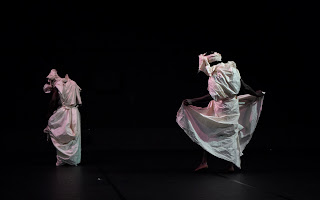
London – The promotional material for L’Homme Rare promised “insistent use of buttocks,” and it certainly delivered. Throughout the performance, five naked male dancers present themselves facing away from the audience, their backsides continuously on display. The choreography leaves no muscle untwerked, featuring a symphony of bottom slaps and formations reminiscent of Swan Lake’s cygnets, with each dancer’s arms around the others’ waists, holding a bum cheek in each hand.
As with many stage performances featuring nudity, the initial shock value quickly fades, leaving the audience to contemplate the diverse shapes and skin tones of the dancers’ bodies. Observers are invited to notice the details: the hip bones, shoulder blades, dimples, and the indentation running down the spine. Glazed in sweat, their forms take on an abstract beauty—though a body is never truly abstract. This deliberate objectification is a central theme in this work by Nadia Beugré, an Ivorian choreographer now based in France, presented as part of this year’s London International Festival of Theatre.
The concept of dancers turning their backs to the audience is not without precedent. For instance, Trisha Brown’s 1994 solo If You Couldn’t See Me was performed facing upstage (albeit clothed). In L’Homme Rare, this positioning encourages a close study of the forms before us, making them anonymized yet still individually expressive. One dancer, in particular, sings in diva-like fashion while wearing patent red platform heels—later, a similar shoe transforms into a hat and a codpiece. Movements occur in bursts, with sheets turned into props, creating dynamic interactions: a white dancer briefly grasps the neck of a black dancer, who then rests his head on the other’s shoulder, a fleeting but poignant moment.

A prominent theme in L’Homme Rare is the reversal of the male gaze. Beugré also delves into “feminine” movements: strutting in heels and the virtuosic, shimmying vibrations of mapouka, an Ivorian dance that prefigures twerking and is traditionally performed by women. The performance makes the audience complicit in the exoticized perception of the erotic black male body. While these are compelling ideas, they often feel like they are left hanging. Beugré engages deeply with these themes, but the question remains whether she effectively engages the audience in them.
L’Homme Rare is on at Queen Elizabeth Hall, London, until 13 June. The London International Festival of Theatre continues until 27 July.


